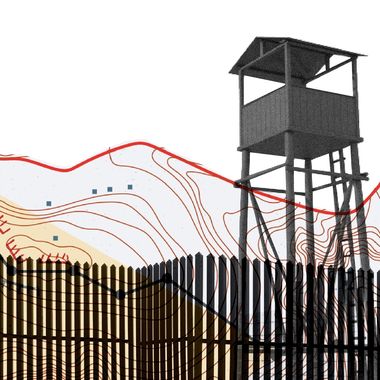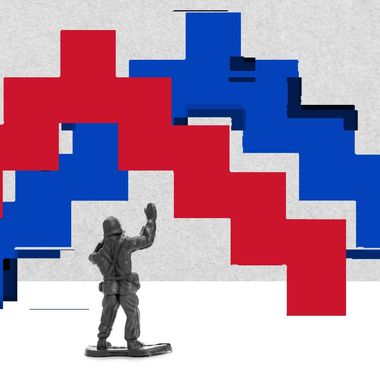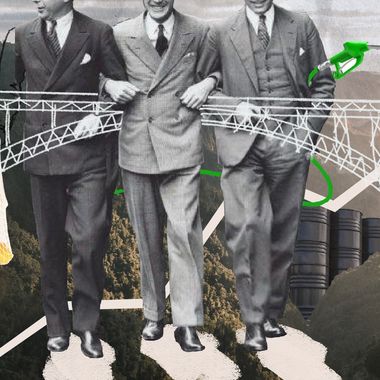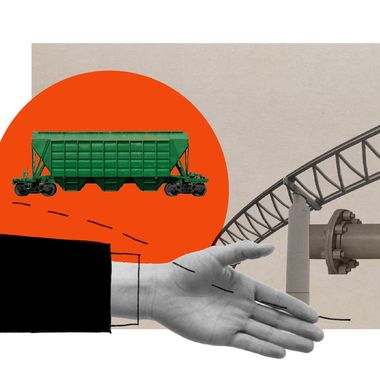Tue Nov 02 2021 · 8 min read
Russian-Azerbaijani Relations: Tension or Intention?

By Tatevik Hayrapetyan
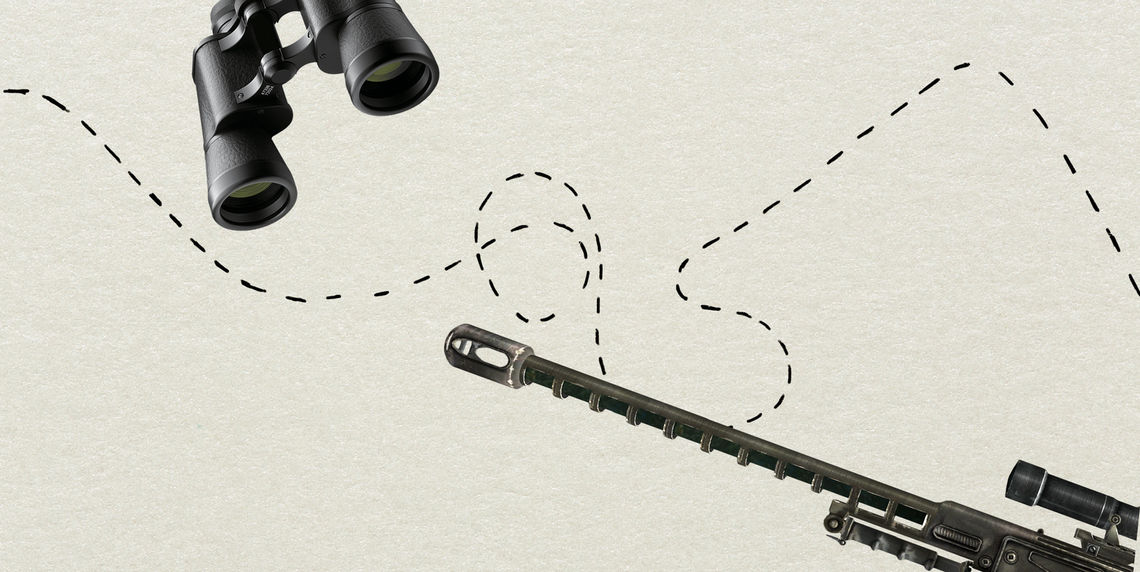
Illustration by Armine Shahbazyan.
On October 9, 2021, a civilian was killed in the northern city of Martakert in Artsakh by Azerbaijani fire while farming. This was the first time after the November 9 trilateral ceasefire statement that a civilian had been killed in Artsakh. Though official Baku denied this information, the Russian Defense Ministry confirmed the death.
Armenia’s Prosecutor General’s Office issued a statement noting that Russian peacekeepers arrived at the field where agricultural work was being carried out to ensure the security of the people given its proximity to the Line of Contact. According to the statement, Aram Tepnunts, 55, a resident of Martakert initially did not want to drive the tractor fearing for his safety, but one of the peacekeepers offered to sit in his cab as an additional guarantee. According to eyewitnesses, they made several turns in the tractor together.
However, the presence of the Russian peacekeeper couldn’t ensure the security of Tepnunts. He was shot in the chest and died on the scene. With this incident, Azerbaijan openly challenged the Russian peacekeeping mission in Artsakh.
Back in October 2020, when the 2020 Artsakh War was still raging, President Vladimir Putin of Russia recalled that the Nagorno-Karabakh conflict had started from ethnic clashes, first in the city Sumgait, and later in Nagorno-Karabakh. “The government of the Soviet Union took no measure to provide security to the people. Armenians took weapons and protected themselves. Either they did it right or wrong, but the initial motivation for those negative events was based on ethnicity…”, Putin said. Accordingly, ensuring the security of the Armenians of Nagorno-Karabakh from ethnic cleansing is the main objective of the Russian peacekeeping mission, which Azerbaijan has started to question a year after the end of the hostilities. It is important to ask, what are the short-term and long-term plans behind the Azerbaijani provocation? What are the political and social understandings within Azerbaijan for the Russian presence in Nagorno-Karabakh? And why would Azerbaijan want to delegitimize the peacekeeping mission?
By signing the trilateral ceasefire statement, Azerbaijan agreed to the deployment of the Russian peacekeeping mission in Artsakh. According to the 4th point of the statement, “The peacekeeping troops of the Russian Federation shall stay there for a period of 5 years, with automatic extension for the next 5-year periods, if none of the Parties declares of its intention to terminate the application of this provision 6 months before the expiration of the preceding period.” Not surprisingly, Azerbaijan has not yet signed the peacekeeping mandate, which is basically an additional legal document after the ceasefire statement. This was also highlighted by Armenia’s Foreign Affairs Minister Ararat Mirzoyan who said that Azerbaijan is carrying out inflammatory propaganda against the Russian peacekeeping mission and questioning their expediency and effectiveness. “In this context, the cases of capture of Armenian servicemen in the areas of responsibility of the peacekeepers should also be considered,” Mirzoyan added.
Simultaneously, official Baku has started to point out that the Russians are only in Nagorno-Karabakh temporarily. Recently, in an interview to the BBC, Assistant to the President of Azerbaijan Hikmet Hajiyev noted that “certain discussions are being held on additional legal mechanisms in connection with the mandate of the Russian peacekeepers.” The Azerbaijani official noted that “…the peacekeeping forces are temporarily deployed in a certain part of the Karabakh region of Azerbaijan.” Immediately after this, Ilham Aliyev himself started to express complaints about the Russian peacekeeping mission. In an interview with Turkey’s Anadolu news agency, Aliyev said that the Russian peacekeepers are not preventing foreign citizens from entering the region, despite the ban imposed by the Azerbaijani authorities. He pointed out that this issue has been repeatedly raised in negotiations with the Russian side, but the problem has not been resolved. “Because Karabakh is our territory, no foreign citizens or vehicles can enter these areas without our permission,” Aliyev said.
The delay in signing the peacekeeping mandate is definitely not technical but mostly political. Baku can use it as a bargaining tool with Russia, and it also helps Aliyev save face in front of Azerbaijani society. Though Aliyev keeps saying that “the conflict is resolved,” from the very moment the Russian contingent was deployed, some Azerbaijani opposition figures began to criticize Aliyev for it. Ali Keremli, the head of Azerbaijan’s Popular Front Party, tweeted on July 27 of this year that Ilham Aliyev had lied when he told the people that he had solved the Karabakh conflict. A day later, Keremli tweeted: “By inviting the Russians, Ilham Aliyev didn’t let the heroic Azerbaijani Army end the battle with the enemy. Now we have returned to the situation before the Second Karabakh War. Again there is a contact line with the enemy. Again the ceasefire regime is not kept and we have losses.”
The anti-Russian mood in Azerbaijan has deeper roots and dates back to the 1990s. During the January 1990 pogrom of the Armenian population of Baku, Soviet troops entered Baku to restore order. The events, known in Azerbaijan as “Black January”, set the impression in Azerbaijan that the Russians were pro-Armenian. Also, after the First Nagorno-Karabakh War, it was perceived in Azerbaijan that the Armenians had only won due to Russian assistance. Interestingly, after the 2020 Artsakh War, the Russians were once again blamed for not letting Azerbaijan enter Stepanakert. The undeniable Turkish military and political support during last year’s 44-day war shifted Azerbaijani public opinion to be more pro-Turkish and anti-Russian. In April 2021, an anti-Russian rally was held in Baku, where some opposition groups demanded the replacement of the Russian peacekeepers with Turkish military personnel. In the context of an authoritarian regime, the fact that this rally was allowed to proceed implies tacit approval by the Aliyev government.
The killing of a civilian in Artsakh opened a new stage for the tension. A few days later, Azerbaijan reported that one of its soldiers had been killed in Artsakh. While that information was denied by Artsakh officials, Armenian news outlets reported about six wounded Armenian soldiers as a result of a ceasefire violation by Azerbaijan. Afterward, quite a provocative statement was made by an Azerbaijani MP, saying that “as a response to a killed Azerbaijani soldier, 20 Armenian soldiers should be killed.” The statement was a striking example of anti-Armenian hatred propaganda at the state level.
This is neither the first nor the last time Azerbaijan has undertaken steps to delegitimize the Russian presence in Nagorno-Karabakh. Another example was the recent military exercise in Lachin, in close proximity to where Russian peacekeepers are stationed. On October 19, the Azerbaijani Ministry of Defense reported that “The Command-Staff Exercises examine the interoperability of the Land Forces with other types of troops by the implementation of modern management techniques.” The duration and the number of personnel taking part in these exercises were not mentioned in the official release. These exercises took place about a month after Azerbaijani-Turkish joint military exercises at the same location. Considering the fact that the Lachin Corridor is essential to Artsakh as the only remaining connection with Armenia, these kinds of drills openly show the intention to cut the connection if and when the regional situation affords.
Back in July 2021, Aliyev said, “The people of Azerbaijan are truly disappointed when today in France and in the USA statements are made in contradiction with the reality that the conflict is resolved. I tell them: I am the President of Azerbaijan, and I have already solved this issue. There is no Nagorno-Karabakh, no status. 25,000 people live there. Where is the logic in creating status for 25,000 people?” Responding to Aliyev, former Minister of Labor, Social and Resettlement Affairs of the Republic of Artsakh Mane Tandilyan retorted: “Ilham Aliyev stated that there are 25,000 Armenians living in Artsakh, thereby it is not logical to discuss the issue of status, clearly acknowledging that it is the Armenians living in Artsakh who play a decisive role for the status of Artsakh. Immediately after the end of the war, due to the exceptional will and dedication of the people of Artsakh, the return of the deportees was carried out very quickly in Artsakh and at the moment more than 120,000 Armenians live in Artsakh.”
In addition, Artsakh State Minister Artak Beglaryan also mentioned that following the war, out of 150,000 people, approximately 120,000 remained or returned to Artsakh. “I think this is the best indicator for the trust of the locals toward, first of all, the Russian peacekeeping contingent. This also shows the will of our people to live and create in their homeland, even in such difficult circumstances,” he added.
Beglaryan highlighted that, because Azerbaijan “is continuing its anti-Armenian and genocidal policy,” the issue of the withdrawal of the Russian peacekeeping mission in five years should not even be discussed.
Official Baku is trying to link the prospects of the future status of Artsakh with the number of Armenians living there. It then resorts to falsifying the population figure in order to try to prevent further negotiations on the final and comprehensive settlement of the conflict, which would also imply an official status, based on the right of self-determination of peoples, as one of the principles advanced by the OSCE Minsk Group Co-Chairs.
Thus, by challenging the Russian peacekeeping mission, Azerbaijan wants to delegitimize the longer term role of Russia and make Armenians in Artsakh feel insecure, even while the Russians are still there. If it leads to more Armenians in Artsakh leaving their homes, it would help Azerbaijan “solve the issue.” That is, it would close the discussion on status and also chip away the justification for the Russian peacekeeping mission. Simultaneously, Azerbaijan and Turkey are clearly developing a military plan to cut the connection between Armenia and Artsakh, as the drills make no secret of.
Russia always tried to combine the roles of mediator, strategic partner and peace guarantor with its business interests in the South Caucasus. It gets quite complicated and paints a spectrum of attitudes toward Russia among the people in the South Caucasus. However, the Turkish-Azerbaijani joint approach shows that the two states have decided to achieve their strategic objectives “stage by stage.” After the 2020 Artsakh War, we are witnessing new tension between Azerbaijan and Turkey on one side and Iran on the other. Eventually, Ankara and Baku aim to get rid of the Russian presence in the South Caucasus. This should be clearly understood in Moscow: today’s seemingly small tensions and incidents in Artsakh open up space for longer term intentions against Russia in the region.
An adequate response is necessary to prevent further negative developments. At the same time, Armenian diplomacy also needs to act accordingly and properly. Taking into consideration that the three OSCE Minsk Group Co-Chairs are also members of the UN Security Council, Armenia can take measures and necessary diplomatic steps to provide additional support through international organizations to the Russian peacekeeping mission. This can be another diplomatic tool to neutralize security threats coming from Azerbaijan and Turkey.
Also read
Armenia’s New Security Architecture: Russia as Geopolitical Bodyguard
By Nerses Kopalyan
Armenia needs to reconfigure the political economy of its security architecture by utilizing its security alliance with Russia, through a mechanism of burden-sharing, where Russia’s geopolitical interests are aligned with Armenia’s security interests.
Russia’s Increasing Military Presence in Armenia
By Hovhannes Nazaretyan
When Armenia declared independence in 1991, there was still a large contingent of Soviet troops in the country. Russian military presence, however, stretches back to the early 19th century and now, after the 2020 Artsakh War, is expanding.
Russian Peacekeepers in Artsakh
By Lusine Sargsyan
A day after the trilateral agreement ending the 2020 Artsakh War was signed, the first contingents of Russian peacekeepers were deployed. Six months in, clarifications regarding the size, mandate and mission of the peacekeepers are still not clear.
Russia’s Partnership With Turkey and What It Means for Armenia
By Zaven Sargsian
Many assumed that Turkey’s direct involvement in the 2020 Artsakh War and thereby its intrusion into Russia’s “near abroad” would be met with hostility by Russia, or at least vocal condemnation. The reaction was mild, writes Zaven Sargsian.
The Turkey-Georgia-Azerbaijan Regional Triangle
By Anna Barseghyan
Turkey, Georgia and Azerbaijan institutionalized their triangle long before the 2020 Artsakh War and have established deep roots of cooperation.
The Escalating Tensions Between Iran and Azerbaijan
By Hranoush Dermoyan
Since the end of the 2020 Artsakh War, tensions between the Islamic Republic of Iran and Azerbaijan have been escalating. Although an outright military confrontation seems unlikely, it would have devastating consequences for the region.
Armenia Eyes Infrastructure Cooperation With Iran
By Arthur Manukian
As Armenia seeks to develop a new national security framework following the defeat in the 2020 Artsakh War, relations with Iran could play an increasingly important role.
Comments
Khoren Y. Mahtevossian
11/10/2021, 2:12:36 AMThis is a fine article that correctly identifies Azerbaijan and Turkey's goal against Artsakh: annihilation. It is obvious, at least to me, that Erdogan is telling Aliyev to be outright hostile to Putin and show the latter that he, not only Artsakh, has lost and needs to exit the situation. Putin does not seem to realize any of this or is hoping that Aliyev and Erdogan are his friends. I continue to be disappointed, however, that Armenians do not wish to publicly admit what most thinking people know: Russia utterly and deliberately betrayed Armenians and is not making any attempt to hide it. Russia continues to humiliate Armenia in every way possible even as Azerbaijan and Turkey outmaneuver Putin.
baghdassarian hovig
11/3/2021, 5:41:55 PMwow,great reporting,hope your words can be discussed on high level diplomacy

